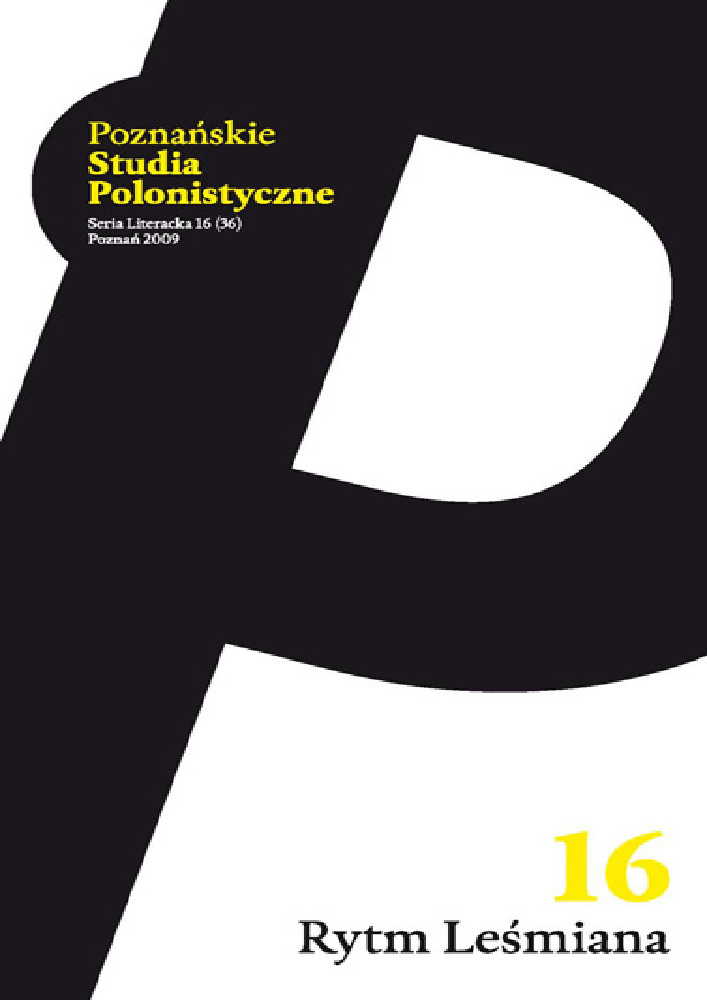Abstract
The book Twórczość Leśmiana w kręgu filozoficznej myśli symbolizmu rosyjskiego written by Sobieska is a pioneering attempt at combining a discussion on the literary output of the author of Dziejba leśna with the reflection stemming from the tradition of the Eastern Orthodox Church. The book, notwithstanding its shortcomings and self-imposed limitations, comprehensively discusses views and opinions hitherto unknown to the Polish reader, introduces and explains the context of the findings of such thinkers as Soloviov or Biely, compares texts written by Russian symbolists with Leśmian’s poems. Sobieska categorizes the problem issues into subsequent thematic ranges (epiphany insight into the nature of being, musicality and the notion of poetical metre, creative imagination, mystical femininity) in order to point at potential sources of the recontextualization of Leśmian’s poetical sensitivity. The findings, being an example of classic comparatistic studies, have been enhanced by iconological and musicological observations as well as by some additional guiding elements facilitating the understanding of Orthodox theology. The present sketch discusses the book and is complemented with a polemics with some of its methodological solutions.References
Głowiński M., Zaświat przedstawiony. Szkice o poezji Bolesława Leśmiana, Kraków 1998.
Hegel G.W.F., Fenomenologia ducha, przeł. Ś.F. Nowicki, Warszawa 2002.
Heidegger M., Bycie i czas, §44, przeł. B. Baran, Warszawa 2005.
Kozyra A., Filozofia nicości Nishidy Kitarō, Warszawa 2007.
Markowski M.P., Polska literatura nowoczesna. Leśmian, Schulz, Witkacy, Kraków 2007.
Sobieska A., Twórczość Leśmiana w kręgu filozoficznej myśli symbolizmu rosyjskiego, Kraków 2005.
License
Authors
Authors of texts accepted for publication in „Poznańskie Studia Polonistyczne. Seria Literacka” are required to complete, sign and return to the editor's office the Agreement for granting a royalty-free license to works with a commitment to grant a CC sub-license.
Under the agreement, the authors of texts published in „Poznańskie Studia Polonistyczne. Seria Literacka” grant the Adam Mickiewicz University in Poznań a non-exclusive, royalty-free license and authorize the use of Attribution-NoDerivatives 4.0 International (CC BY-ND 4.0)Creative Commons sub-license.
The authors retain the right to continue the free disposal of the work.
Users
Interested Internet users are entitled to use works published in „Poznańskie Studia Polonistyczne. Seria Literacka” since 2016, for non-commercial purposes only, under the following conditions:
- attribution - obligation to provide, together with the distributed work, information about the authorship, title, source (link to the original work, DOI) and the license itself.
- no derivatives - the work must be preserved in its original form, without the author's consent it is not possible to distribute the modified work, such as translations, publications, etc.
Copyrights are reserved for all texts published before 2016.
Miscellaneous
Adam Mickiewicz University in Poznań retains the right to magazines as a whole (layout, graphic form, title, cover design, logo etc.).
